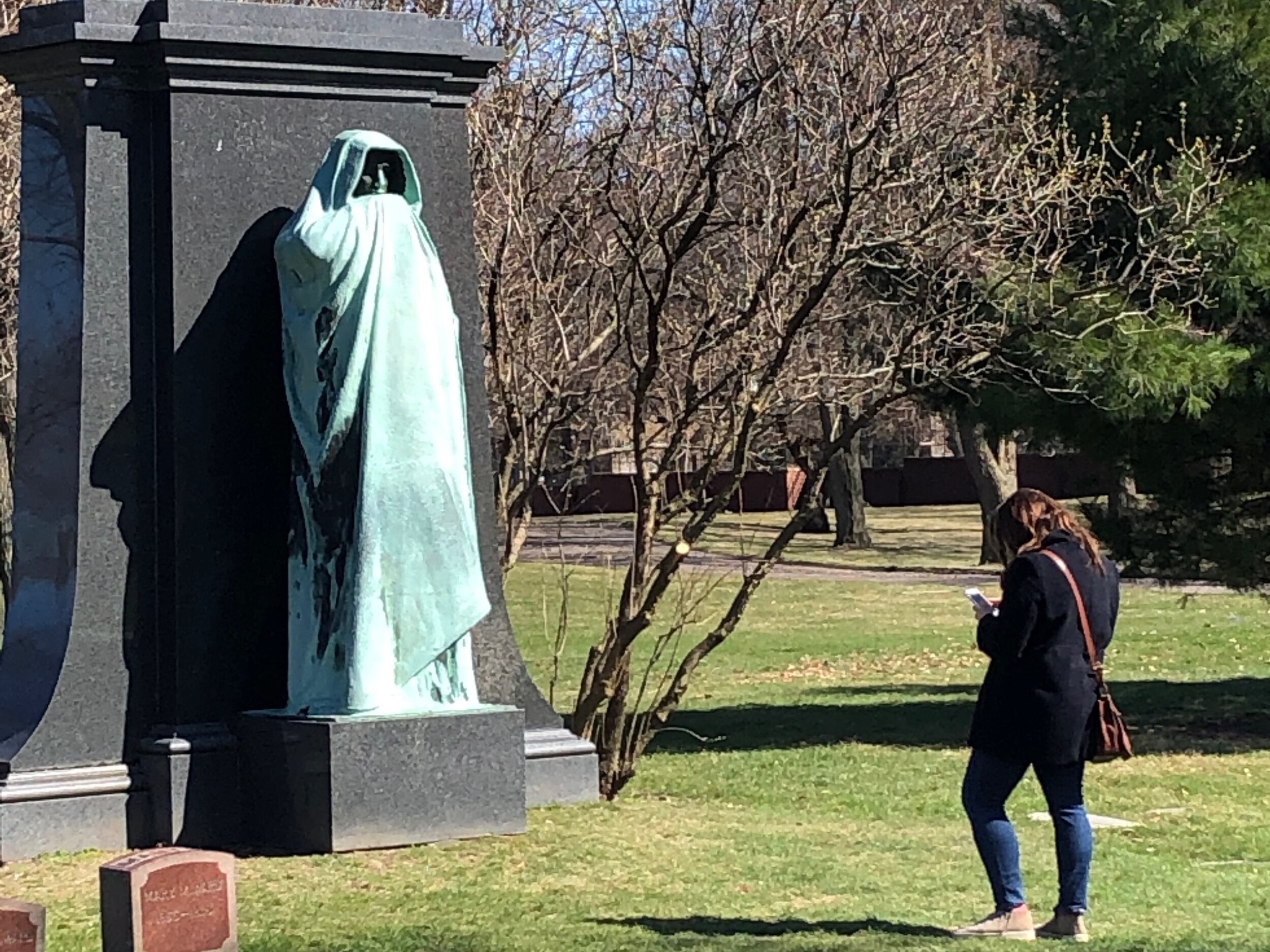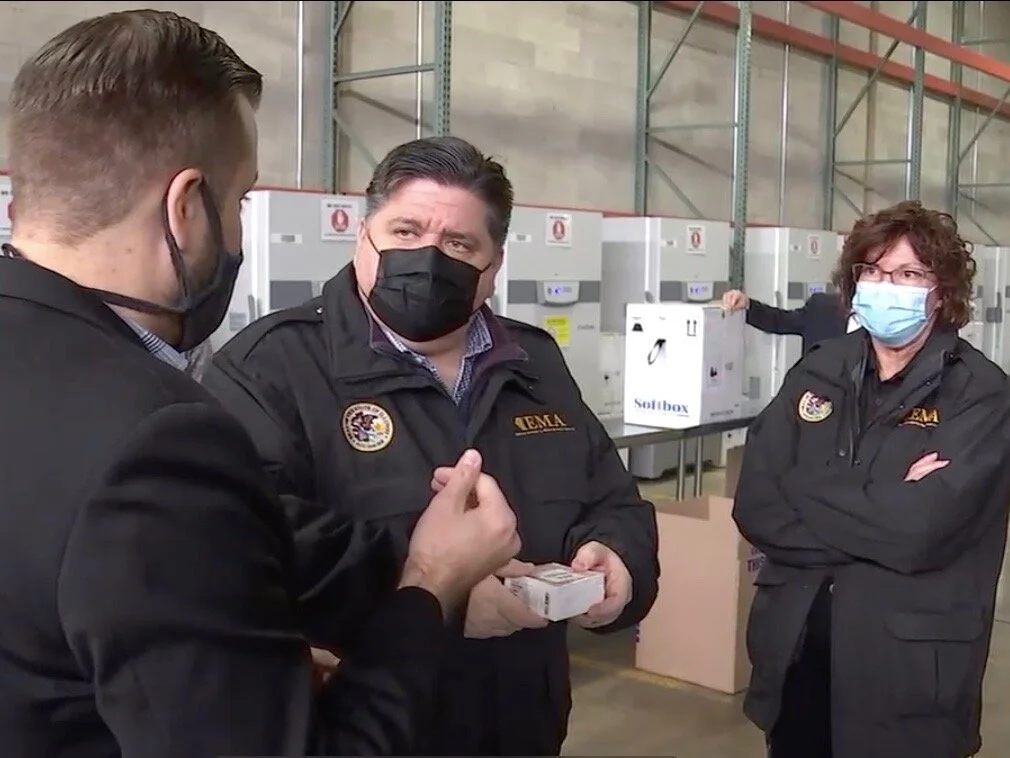Sic transit annus horribilis
It was a very dark year, but not without glimmers of hope for the future
A masked visitor to Graceland Cemetery in Chicago pays homage to Lorado Taft’s sculpture “Eternal Silence” early on in the pandemic. (One Illinois/Ted Cox)
By Ted Cox
The year began with President Trump facing impeachment over charges he coerced Ukraine to dig up dirt on Joe Biden and then obstructed justice in covering up the scandal, and with a few exceptions providing glimmers of hope it only got worse from there.
The COVID-19 pandemic reached Illinois and the rest of the United States in February, and by March the economy was shutting down over mitigation efforts to stem the spread of the coronavirus.
By the end of the year, the state had confirmed almost a million cases of COVID-19, resulting in more than 16,000 deaths. Trump’s failure to organize a coherent federal response — indeed, his refusal to accept any responsibility at all — contributed to a total of almost 20 million cases nationally and 350,000 deaths. The economy staggered on through periodic openings and reclosings. Gov. Pritzker said early on in the pandemic, “I’m not willing to sacrifice anyone” for the sake of simply keeping the economy running, and he held true to that throughout the year, taking action while the Trump administration dithered.
Protesters accused Senate Republicans of conducting a “cover-up” in rejecting the case for impeachment, and the election year continued on with the society seemingly accepting that, given the political divide, the issue was in the hands of voters.
After some early missteps on the campaign trail, former Vice President Joe Biden righted his political ship and claimed the Democratic nomination for president, winning the Illinois primary along the way.
The election went off smoothly Nov. 3, and by the end of that week an extended count resulting from an abundance of mail-in ballots nationwide in the pandemic arrived at the conclusion that Joe Biden defeated Donald Trump to become the 46th president next month, with U.S. Sen. Kamala Harris of California set to become the first woman vice president and the first person of color to occupy the second-highest position in government. Illinois could claim Harris as a childhood resident as she briefly lived in Champaign-Urbana when her Indian and Jamaican parents worked at the University of Illinois.
The Democratic U.S. representatives who unseated Republicans in suburban districts two years ago both won reelection, with Congresswoman Lauren Underwood defeating state Sen. Jim Oberweis and Sean Casten fending off a challenge from former governor candidate Jeanne Ives. U.S. Sen. Dick Durbin was elected to a fifth term.
But the coronavirus also worsened a statewide teacher shortage, and the Illinois Department of Employment Security was swamped with unprecedented claims for unemployment benefits.
That was the story of the year, glimmers of hope in the darkest of days.
Gov. Pritzker signed a cap on insulin costs early in the year, and that actually takes effect with the new year on Friday, along with a $1 increase in the minimum wage.
In the days before COVID-19 shut down large-scale gatherings — or gatherings of any kind outside a household — the Women’s March, a national movement, returned to Chicago.
Trump warmed up for a slew of pardons he granted to political associates before the end of the year by first commuting the sentence of disgraced and imprisoned former Gov. Rod Blagojevich in February, over the objections of Republicans in the Illinois congressional delegation — and most state residents, for that matter.
Illinois House Speaker Michael Madigan of Chicago was implicated in a federal bribery case charging that ComEd had tried to influence legislation in the General Assembly by granting favors and jobs to his political allies. Madigan declared himself innocent and unaware of any attempts to influence him, but Gov. Pritzker said, “If Speaker Madigan wants to continue in a position of enormous public trust, with such a serious ethical cloud hanging over his head, then he has to — at the very least — be willing to stand in front of the press and the people and answer every last question to their satisfaction.” Madigan declined, however, and is trying to remain in the post when the General Assembly returns for a new session next month.
The cloud of corruption over the speaker was blamed in part for the loss of the Fair Tax Amendment, however, as billionaires funded a TV ad campaign linking Madigan to the initiative and to state Supreme Court Judge Thomas Kilbride, who also went down to defeat in his retention campaign. Political experts said Republicans were behind both defeats, without having to make their party affiliation an open issue. State Treasurer Michael Frerichs decried the “mudslinging and the dirty tricks” in the campaign.
That leaves state government grasping for funds at the same time the coronavirus has diminished tax revenues. The budget hole created in part by rejection of a graduated income tax, made worse by the coronavirus economic collapse, was the most pressing piece of business facing the General Assembly once it returns to Springfield next year — after first determining the fate of the House speaker.
Gov. Pritzker oversaw delivery of the first COVID-19 vaccines this month as Illinois took the early lead in a nationwide inoculation program. (Illinois Governor’s Office)
Following the death of George Floyd at the hands of Minneapolis police over the Memorial Day weekend, the nation was roiled by protests across the country, which sometimes turned violent, as in Chicago. But there was also a peaceful Black Lives Matter march in Anna, a southern Illinois community once known as a “sundown town” where African Americans were not welcome after dark.
One of the few financial bright spots for the state in the midst of the pandemic was the tax revenue stemming from legalization of marijuana, which outpaced projections. With a month to go in the first full year of legalization in Illinois, the state had taken in $150 million in taxes from recreational cannabis, on $582 million in sales. In fact, by the end of the year revenues from adult use of marijuana were closing in on liquor taxes, and it looked like only a matter of time before legal weed would become the state’s leading sin tax.
The state declared a new poet laureate, Angela Jackson, the fifth person to fill the role, but along the way Gov. Pritzker also honored singer-songwriter John Prine posthumously as the fourth Illinois poet laureate following his death from COVID-19 in April. Talk about glimmers of hope in darkness.
Perhaps worst of all, U.S. Supreme Court Justice Ruth Bader Ginsburg died shortly before the election, and President Trump succeeded in pushing through the nomination of Amy Coney Barrett to fill her seat, which could have ramifications for years to come as conservatives claim a clear majority on the high court.
With so much calamity across the country, Illinoisans were briefly charmed over the summer in monitoring the progress of Bruno, a black bear who crossed into the northwest corner of the state from Wisconsin, then wound his way to Iowa and back and down the edge of western Illinois until crossing the Mississippi River just north of St. Louis. At one point, Illinois State Police held up traffic to help the bear cross Interstate 72. Bruno was briefly tranquilized and relocated in Missouri before being released and traveling on and was last reported living peacefully in Arkansas.
But critics could call that one more example of population loss in the so-called Illinois exodus, as U.S. Census Bureau estimates found the state population decline accelerating — pending the final count in the official 2020 Census, expected to be released early next year.
It was that kind of annus horribilis. For all the bad news, there were glimmers of optimism, but for every bit of good news there was cause for despair.
By the end of the year, however, there were also two COVID-19 vaccines available, with more on the way, and Illinois led the country in the early stages of a nationwide inoculation program that promised recovery in the year ahead. So, by all means, bring on 2021, with a new president, a new Congress, a new General Assembly, and most of all a new normal.


